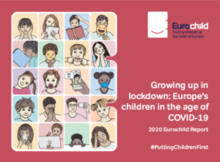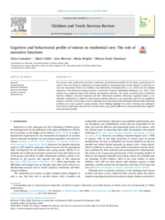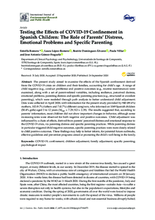Displaying 31 - 40 of 149
This study aims to examine the consequences of the last great recession on the child protection system (CPS) in Spain, to estimate whether there is any kind of relationship between the conditions of socio-economic crisis and its protective activity.
This cross-national study compares and contrasts how two states- one in the U.S. (Illinois) and one in Spain (Catalonia)—support care leavers as they transition into adulthood.
This webinar was part of Eurochild’s breakfast webinars to mark World Children’s Day 2020. The webinar looked at how the European Child Guarantee initiative can help address the growing challenge of child poverty, particularly the deepened economic divides that have resulted from the COVID-19 pandemic, and brought the perspective of the Spanish government, which has made the fight against child poverty a particular priority.
This report reflects on the effects of the coronavirus pandemic on children. It compiles information gathered from 25 countries across Europe, and provides recommendations for improving public policies in the short and long-term to support better outcomes for children and families, including children in alternative care or at risk of separation.
No reconocimiento de Kafala constituida entre ciudadanos marroquíes a efectos de adopción. Antecedentes y alcance de la prohibición contenida en el artículo 19.4 de la Ley de adopción internacional.
The present study analysed the executive, emotional, and behavioural profile of 121 minors aged between 13 and 17, who were living in residential care homes funded by Asociación Nuevo Futuro (Spain).
The present study aimed to examine the effects of the Spanish confinement derived from the COVID-19 crisis on children and their families, accounting for child’s age.
This article presents the results of a qualitative study whose objective was to collect information on the perceptions of changes in parents and their children who are in the Spanish foster care system after completing a positive parenting programme.
This study aims to analyse the interaction between children in foster care and their main caregivers during a microcoded co‐construction task, focusing on the verbal and non‐verbal behaviours that the adults use to promote a secure attachment in the child.
Qualitative research based on a multiple‐case study was designed and carried out in Spain with the aim of deepening the understanding of the individual school experiences of three children in residential care.



